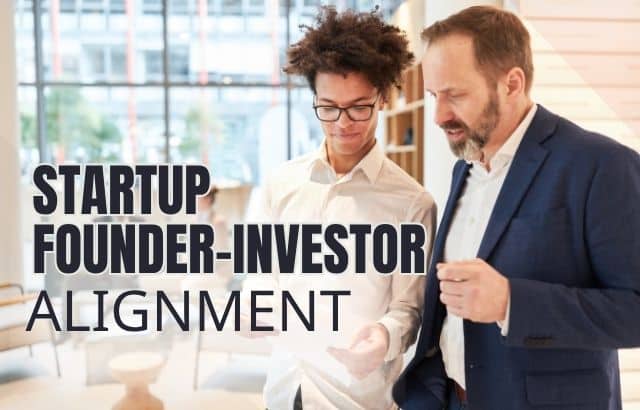Not All Partnerships Are Meant to Scale
Just because someone has money and you need it doesn’t mean it’s a perfect match.
When startups fail, most people blame the market, the model, or the product.
But often, the real issue is hidden beneath the surface: misalignment between founder and investor.
Wrong expectations, mismatched mindsets, and value conflicts can silently break a growing business.
This blog is designed to create clarity—for both founders and investors.
Because smart partnerships don’t happen by chance.
They happen by design.
Table of Contents
🧠 SECTION 1: What Is a Founder—And Why Their Mindset Shapes Everything?
A founder is someone who turns a problem into a possibility.
They start with an idea, take a risk, and begin building something from scratch.
But a founder is not just a creator. They’re a decision-maker, a leader, and a visionary.
They wear multiple hats—product designer, sales closer, team builder, investor pitcher, and sometimes therapist.
What defines a good founder?
- Vision clarity: Do they know what they’re building and why it matters?
- Execution mindset: Can they turn an idea into action?
- Resilience: Can they stand tall during storms—personal and professional?
- Adaptability: Are they coachable? Willing to pivot?
💬 Hirav Shah explains:
“A founder’s energy becomes the company’s energy. When the leader is aligned, the whole business flows better.”
💰 SECTION 2: What Is an Investor—And Why They’re More Than Just Money?
An investor is someone who puts in capital (and sometimes time, network, or mentorship) with the goal of seeing multiplying returns.
But a smart investor is not just a financier—they’re a partner in growth.
There are many types of investors:
- Angel investors: Early believers who fund in the idea or team
- Venture capitalists: Institutional money focused on exponential growth
- Strategic investors: Those who add domain knowledge and long-term partnership
- Private equity / family offices: Focused on scaling, profitability, or acquisition-ready models
What defines a good investor?
- Patience: They’re not expecting overnight magic
- Involvement: They add value without interfering daily
- Alignment: Their values match the founder’s direction
- Clarity: They know when to support, when to question, and when to exit
💬 Hirav Shah says:
“A great investor sees not just where the startup is—but where it can go, and how to help it get there.”
🔍 SECTION 3: What Makes This Relationship So Important?
A founder–investor relationship is like a co-pilot agreement.
One drives daily. The other helps navigate, review, and redirect when needed.
This relationship affects:
- Strategic decisions
- Fundraising rounds
- Hiring/firing key people
- Brand perception
- Long-term exit outcomes
When the chemistry works, it creates exponential growth.
When it fails, the company bleeds quietly—even when numbers look fine on paper.
🧠 This is why this blog matters.
Because most people focus on what’s being built—not who is building it together.
💬 “Misaligned partnerships don’t break overnight—they decay silently. And that’s far more dangerous.”
🧭 SECTION 4: How Founders and Investors Think Differently (And Why Both Views Matter)
Understanding the psychology of both sides prevents friction and improves collaboration.
| Aspect | Founder’s Mindset | Investor’s Mindset |
| Goal | Build something meaningful that solves a problem | Multiply returns and mitigate risk |
| Time Horizon | Emotionally long-term (but operationally short-term) | Financially mid-to-long term, wants milestones |
| Risk Tolerance | Very high — ready to risk comfort and stability | Balanced — wants risk, but with calculated control |
| Emotional Investment | Deeply personal, tied to self-worth | Analytical, data-driven, emotionally neutral |
| Language | Purpose, impact, hustle, team energy | ROI, IRR, burn rate, runway, valuation |
| Strengths | Innovation, agility, vision, execution | Strategic oversight, network, financial clarity |
💬 Hirav Shah often reminds startups and investors:
“One dreams. One disciplines. Together, they deliver.”
🧭 SECTION 5:🔵 5 Things Founders Should Think About Before Taking Investor Money
(Because Capital Without Compatibility Can Cost You Everything)
✅ 1. Do They Understand Your Vision—or Are They Only Chasing Valuation?
Some investors are only interested in how quickly they can flip your company for a return.
Others are genuinely invested in your mission and long-term goals.
Ask yourself:
- Will they support me if growth is slow in the early stages?
- Are they excited about the problem I’m solving, or just the numbers in my pitch deck?
👉 The best investors align with your “why”—not just your “when.”
💬 Hirav Shah says:
“Don’t just take money—take mindset. Alignment scales faster than funding.”
✅ 2. Will They Let You Lead, or Try to Control Every Decision?
You built this. You live and breathe your startup.
But once investors come in, the power dynamics change—if you’re not careful.
Some investors micromanage strategy, team decisions, even your product roadmap.
If your execution style doesn’t match their expectations, friction is guaranteed.
Ask:
- Will I still be able to lead with my instincts and speed?
- Or will I be dragged into approval chains and constant check-ins?
💬 “Execution builds empires. Make sure your investor isn’t a roadblock disguised as a partner.”
✅ 3. Are They Just Providing Capital, or Adding Real Strategic Value?
Money is everywhere.
But investors who bring network, credibility, customers, PR, brand visibility, or guidance are rare.
Smart founders look for more than a cheque.
They look for leverage.
Ask:
- Can this investor open doors I can’t?
- Will they actively mentor or just monitor?
💬 “A cheque helps once. A strategic investor helps for life.”
✅ 4. Will They Stick Around When the Journey Gets Tough?
Startups are not straight lines.
You will have failed experiments, market changes, emotional lows.
If your investor panics or pulls back the moment things go south, you’ll be left fighting alone.
Ask:
- Have they supported other startups through hard times?
- Are they emotionally mature—or just spreadsheet-focused?
💬 “The best investors don’t panic. They partner.”
✅ 5. Do They Truly Understand the Industry You’re In?
A healthtech startup and a fashion brand are not built the same way.
But many investors offer “one-size-fits-all” advice that does more harm than good.
If they don’t understand your audience, your cycles, your unique risks—they’ll slow you down.
Ask:
- Do they have domain experience?
- Have they successfully invested in a similar space?
💬 “When investors understand your battlefield, their support becomes a weapon—not a warning.”
🧭 SECTION 6: 🔴 5 Things Investors Should Think About Before Funding a Founder
(Because Founders Shape Your Returns More Than Spreadsheets Do)
✅ 1. Is the Founder Truly Hungry—or Just Riding the Hype Wave?
There’s a difference between wanting to build a legacy and wanting to trend on LinkedIn.
Many founders are great at talking—but poor at executing.
As an investor, ask:
- Do they have resilience, not just charisma?
- Will they still show up when things get hard?
💬 “Without hunger, startups collapse before they scale.”
✅ 2. Can the Founder Handle Pressure Like a Calm, Strategic Leader?
Every founder looks confident in a pitch deck.
But how do they act when facing brutal feedback, cash crunch, or internal team chaos?
You’re not just investing in a product.
You’re investing in a decision-maker under pressure.
Ask:
- Can they regulate emotions and make smart calls?
- Do they take feedback or get defensive?
💬 “Calm minds win chaotic markets.”
✅ 3. Are They Building a Scalable Business—or Just a Cool Product?
It’s easy to fall in love with a slick prototype, app, or product demo.
But a cool idea isn’t a company.
Ask:
- Is there a business model?
- Is there a customer acquisition plan?
- Can this scale without burning cash endlessly?
💬 “Invest in roadmaps, not just prototypes.”
✅ 4. Is the Founding Team Balanced, Committed, and Complementary?
No one builds a company alone.
You need tech + business + marketing + finance to truly scale.
Ask:
- Is the team well-rounded and stable?
- Are they all-in, or part-time hobbyists?
💬 “Great startups are not built solo. They’re built with synergy.”
✅ 5. Do Their Values Match Yours—and Can You Align on Exit Strategy?
You may believe in 5-year exits. They may be building a 15-year brand.
You may want aggressive reporting. They may value autonomy.
If you’re not aligned early on, problems will show up later—at the worst time.
Ask:
- What kind of legacy does this founder want to build?
- Can we have difficult conversations early?
💬 “Invest in people first. Numbers follow.”
🧭 SECTION 7: 🔍 Final Thoughts: Clarity Is the Real Capital
Great companies are not just built on products and pitch decks.
They are built on people with shared values, long-term trust, and strategic alignment.
So before you shake hands:
- Ask deeper questions.
- Evaluate energy, not just Excel.
- Seek not just financial compatibility—but emotional and strategic fit.
Because when founder–investor chemistry clicks, the rest follows.
💬 “Funding isn’t just about the money—it’s about the mission.” — Hirav Shah
✅ Bonus Section: The 6+3+2 Alignment Filter (For Founders and Investors)
Use Hirav Shah’s proven 6+3+2 model before making any deal:
🔹 6 Core Drivers:
Hard Work, Mindset, Skills, Strategy, Execution, Luck
🔹 3 Inner Traits:
Hunger, Dedication, Consistency
🔹 2 Accelerators:
Innovation, Marketing
✅ Founders: Do you embody these qualities?
✅ Investors: Do you see these qualities in the startup you’re backing?
💬 “When these 11 forces are aligned, startups don’t just survive—they soar.” — Hirav Shah
🧠 Exercise: The Alignment Checklist (For Founders & Investors)
Before you sign a term sheet or transfer funds, pause and complete this quick clarity scan.
For Founders:
✔️ Am I clear on what kind of investor I need—capital, network, strategy, or emotional support?
✔️ Do I feel aligned with this investor’s communication style and expectations?
✔️ Am I willing to give up partial control for the right kind of support?
✔️ Do I trust this investor to stand by me during downturns?
✔️ Are they excited about me and my mission—or just my projections?
For Investors:
✔️ Is this founder resilient, focused, and coachable?
✔️ Do they have clarity on their execution plan—not just passion?
✔️ Can I add real value to this startup beyond writing a cheque?
✔️ Am I emotionally and ethically aligned with this team’s way of working?
✔️ Is my risk appetite in sync with this startup’s timeline?
💬 “If both sides can confidently check 4 out of 5—you’re probably onto something powerful.”
❓ Frequently Asked Questions (FAQs)
🔸 Q1: Should first-time founders avoid raising money too early?
A: Yes. If your product, team, and vision aren’t stable, early money can create pressure without performance. Build foundation first.
🔸 Q2: How can investors validate a founder’s mindset in just a few meetings?
A: Ask about their worst failures, pressure points, and decision-making style. Look beyond the pitch—observe the person.
🔸 Q3: What if I like the investor personally, but we differ on strategy?
A: Misalignment will surface later. Align on non-negotiables first—exit timeline, control, growth pace—before money enters.
🔸 Q4: Do all investors want exits in 3–5 years?
A: No. Many family offices and strategic investors prefer longer-term plays. Always clarify exit horizon upfront.
🔸 Q5: What role does ‘luck’ play in this equation?
A: Timing, team, and energy alignment (what Hirav Shah calls “luck”) can amplify everything. But it works only if your strategy and execution are sound.


















